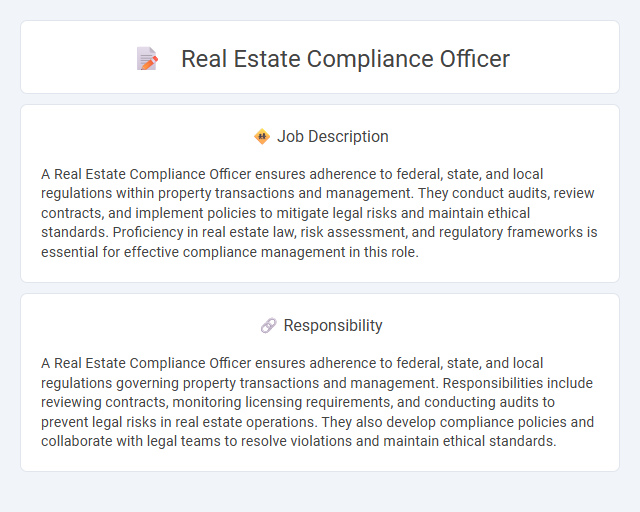
A Real Estate Compliance Officer ensures adherence to federal, state, and local regulations within property transactions and management. They conduct audits, review contracts, and implement policies to mitigate legal risks and maintain ethical standards. Proficiency in real estate law, risk assessment, and regulatory frameworks is essential for effective compliance management in this role.
Individuals with strong attention to detail and a thorough understanding of legal regulations are likely to be suitable for a real estate compliance officer role. Those who prefer structured environments and have the ability to analyze complex documents might find this position aligns well with their skills. Conversely, people who struggle with regulatory standards or lack patience for meticulous review processes may face challenges in this job.
Qualification
A Real Estate Compliance Officer typically requires a bachelor's degree in business, law, or a related field, with professional certifications such as Certified Compliance and Ethics Professional (CCEP) or Real Estate Compliance Certificate enhancing qualifications. Strong knowledge of real estate laws, regulatory frameworks, and risk management is essential for ensuring adherence to local, state, and federal regulations. Effective communication skills and experience with compliance software tools contribute to successfully monitoring transactions and conducting internal audits within real estate firms.
Responsibility
A Real Estate Compliance Officer ensures adherence to federal, state, and local regulations governing property transactions and management. Responsibilities include reviewing contracts, monitoring licensing requirements, and conducting audits to prevent legal risks in real estate operations. They also develop compliance policies and collaborate with legal teams to resolve violations and maintain ethical standards.
Benefit
Real estate compliance officers likely enhance organizational integrity by ensuring adherence to legal and regulatory standards, reducing risks of costly penalties. They probably improve client trust and company reputation through consistent enforcement of compliance policies. Their role may also streamline operations by proactively identifying and addressing potential compliance issues before they escalate.
Challenge
Real estate compliance officers likely face the challenge of constantly adapting to evolving regulations and ensuring thorough monitoring of company practices to avoid legal pitfalls. Managing multiple stakeholders and implementing robust compliance systems may require balancing strict oversight with practical business operations. This role probably demands keen attention to detail and proactive problem-solving to effectively mitigate risks.
Career Advancement
A Real Estate Compliance Officer ensures adherence to legal regulations and internal policies, safeguarding organizations from risks and penalties. Career advancement opportunities often lead to senior compliance roles, such as Compliance Manager or Director, where professionals oversee larger teams and develop strategic compliance frameworks. Gaining certifications like Certified Compliance & Ethics Professional (CCEP) enhances prospects for leadership positions and increases earning potential in the real estate sector.
 kuljobs.com
kuljobs.com